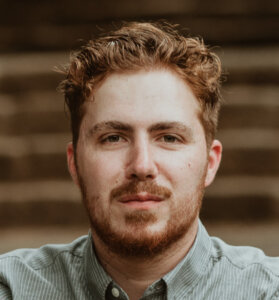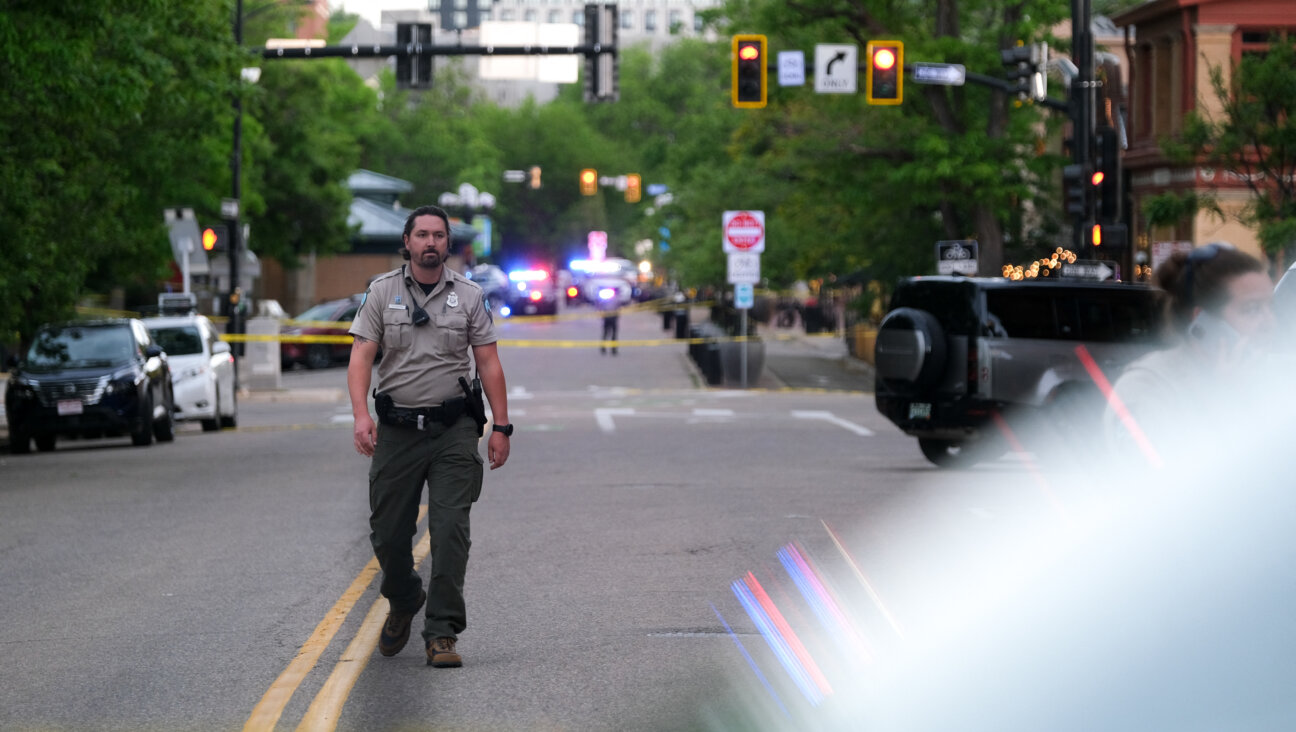Why these Jews are opposed to more federal synagogue security funds
A new coalition of progressive Jewish groups say the popular Nonprofit Security Grants Program is wrong solution for combating antisemitism

A volunteer with Jews For Racial and Economic Justice speaks about community safety at a New York grocery store in February 2020. The group asked lawmakers this week not to expand the Nonprofit Security Grant Program. Courtesy of Zachary Schulman/Jews for Racial and Economic Justice
“Antisemitism Notebook” is a weekly email newsletter from the Forward, sign-up here to receive the full newsletter in your inbox each Thursday
The Jewish community is divided over many aspects of antisemitism. But one thing has always been seen as pareve as tap water: government funding for security improvements. Not anymore.
The federal Nonprofit Security Grant Program was started in 2005, thanks to lobbying by Jewish federations and the Orthodox Union. It has since provided hundreds of millions of dollars to synagogues, day schools and other organizations for security training, gates, fences and surveillance cameras.
While the money is available to any nonprofit vulnerable to terrorism, the vast majority goes to Jewish institutions and urging Congress to up the budget is a common response to upticks in antisemitism.
But a new coalition of nine progressive Jewish groups is now asking lawmakers to reject legislation that would add $400 million to the program. They say the grants provide “insidious cover for the systemic violence caused by the Department of Homeland Security,” which administers the grants while also running other programs — like immigrant detention and deportations — that many liberal Jews have protested against.
Nadav David, a founder of the Community Safety Campaign, which spearheaded the letter to Congress, acknowledged that the coalition needed to go beyond criticism and offer synagogues practical alternatives to the federal program.
“We don’t blame Jewish communities for wanting to find ways to keep their communities safe and secure,” said David.
That’s part of why the campaign doesn’t want to completely end the grants program, but hopes that synagogues will pursue alternative safety models that it plans to highlight in an upcoming report, including:
- Community safety teams: Kavod Boston has trained dozens of volunteers to provide security during major events like High Holidays for synagogues that don’t want to use police or private guards.“There’s something powerful about communities organizing for their own defense,” said Zohar Berman, who worked on the program.
- Changing congregational mindsets: Nahalat Shalom, a Jewish Renewal synagogue in Albuquerque, New Mexico, swapped police protection for ushers doing bag checks, and opted not to install security cameras out of fear that the footage might be used to unfairly criminalize local residents. Amelia Paradise, who helped oversee the changes, said that when staff encounter homeless people sleeping in the synagogue’s courtyard they connect them with services rather than calling the police. “It helps perpetuate practices of care and connectivity and humanization,” she told me, “rather than isolation and separation and fear.”
The Community Safety Campaign knows that the Nonprofit Security Grant Program has a lot of fans: Rabbi Charlie Cytron-Walker credited the training he received through the program with helping him and others survive an 11-hour hostage crisis at his Texas synagogue in 2021.
And Dena Weiss, assistant director of the Secure Community Network, said that doors and cameras paid for by federal grants stopped a former student with a gun from entering Margolin Hebrew Academy in Memphis last summer.
Weiss said her group, which trains Jewish nonprofits across the country, is always sensitive to local needs. But they also try to keep politics — like the question of whether a synagogue protesting DHS deportations should also accept their security grants — out of their advice, which includes building close relationships with law enforcement.
“We don’t typically put anything on the political spectrum,” she said. “Especially with threats it’s kind of irrelevant, honestly. If there’s a threat, there’s a threat.”






















